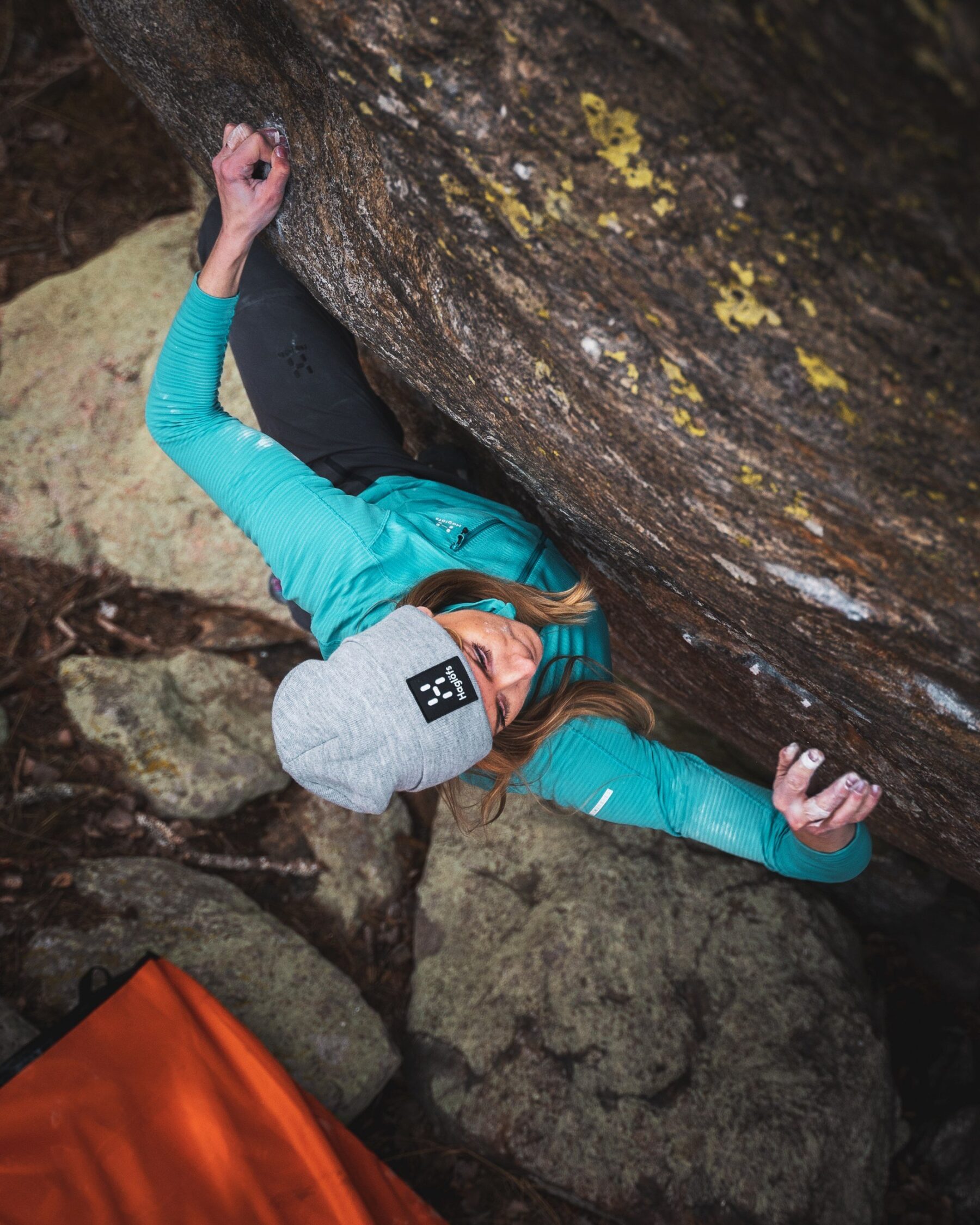Home Story The Lost Trails of Zagros: Mountain Biking in Iraqi Kurdistan
The Lost Trails of Zagros: Mountain Biking in Iraqi Kurdistan
Feature type Story
Read time 15 min read
Published Jul 14, 2020
Author Aaron Gulley
Photographer Dan Milner
On a crisp spring night on the flanks of Bradost Peak, six tents sway in the breeze on a grassy bench in the Zagros Mountains of northern Iraq. Synonymous with war since the US invasion in 2003, Iraq might seem an ill-advised camping spot for a group of adventuring westerners. Mosul, one of the last strongholds of the Islamic State, is down the road, and Kirkuk, a Kurdish separatist hotbed that sees regular air strikes and suicide attacks, is just a bit farther. But if our team logistics expert’s hunch is right, miles of first-rate single-track are also close at hand.
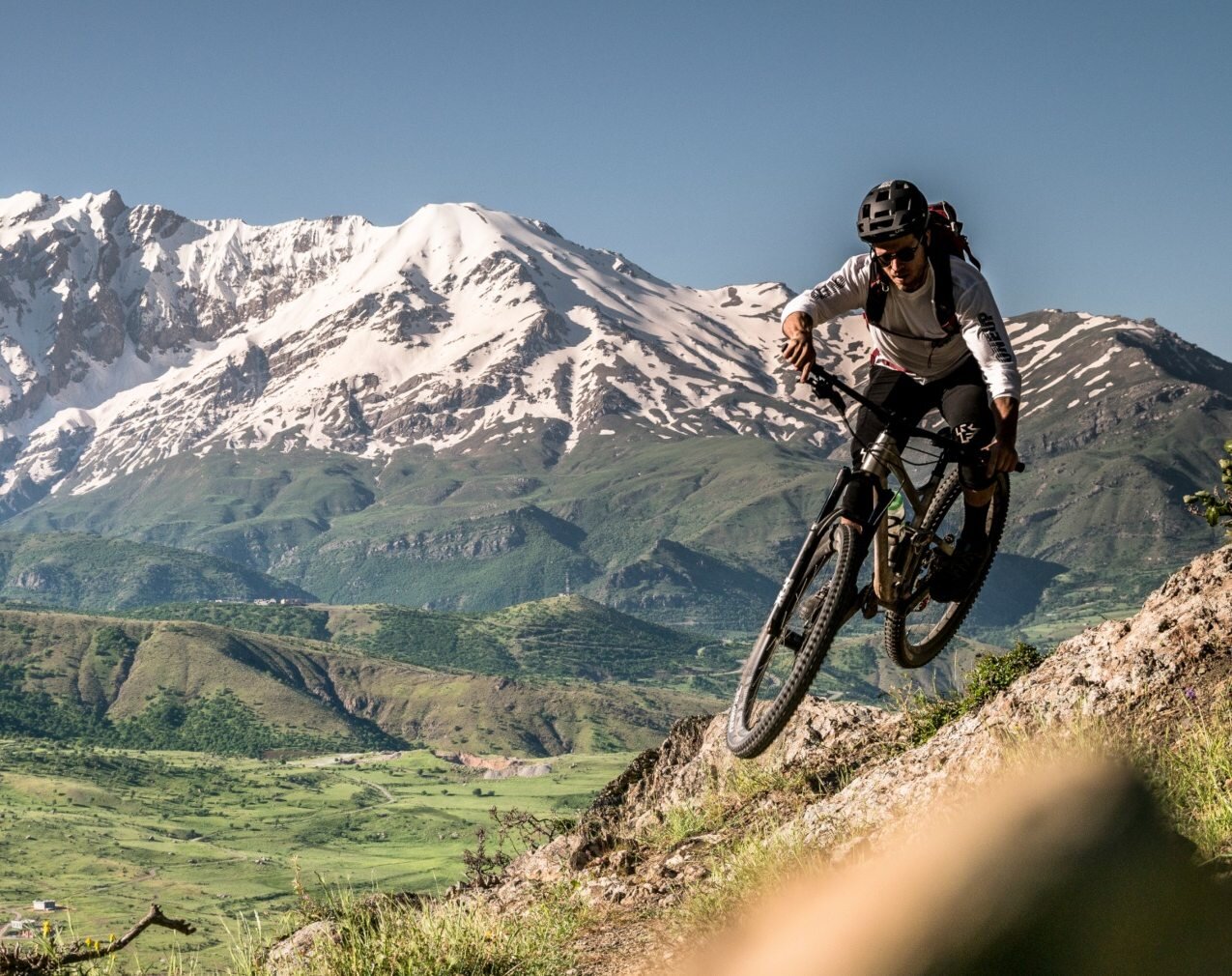
In a twist of irony, Dennis Beare (pictured) and the team discovered some of the best trails of their 8 day trip around Narwanda village, close to the Iran-Iraq border, despite many of the trails being surrounded by old legacy minefields from the Iran-Iraq war in the early 1980s.
We’re here to explore the mountain biking potential of Iraqi Kurdistan, a semi-autonomous swathe of northern Iraq that remains geographically, culturally, and politically apart from the rest of that troubled nation. The Kurds are a stateless people – the world’s largest ethnic group without their own nation state – pressed into the margins of Iran, Syria, Turkey and this northernmost corner of Iraq, a mountain sanctuary of soaring peaks and wild rivers more reminiscent of Alaska than the fiery, flat oilfields the name Iraq conjures.
The law here is the Peshmerga, an independent Kurdish military that sided with the Americans against Saddam Hussein in the chaos that followed his downfall and now patrols a fortified border that insulates their homeland from the rest of the Iraq. As a result, Iraqi Kurdistan is an oasis of relative stability. ‘No westerner has been kidnapped or killed in Iraqi Kurdistan since 2003’ our logistics expert, Tom, assured us in his pre-trip briefing. ‘The only risks are asymmetric bombing attacks, which are infrequent and aimed almost exclusively at government targets, and air strikes on separatist operations, but they’re in known areas that we avoid.’ It’s perfectly safe, he says.
Optimism is Tom’s stock in trade. Having served two tours in Afghanistan as an officer in the British Parachute Regiment, Tom has pedalled in Afghanistan’s Wakhan Corridor, spun downhill runs in the high mountains of the Democratic People’s Republic of Korea (DPRK), and carried his mountain bike to the highest peak in Ethiopia for a 6,000-foot descent. He insists his trips aren’t about courting risk, but rather understanding the world. ‘Traveling to places that we as a society fear makes you realise that people are the same everywhere. It’s the best way to break down preconceptions’ he says.
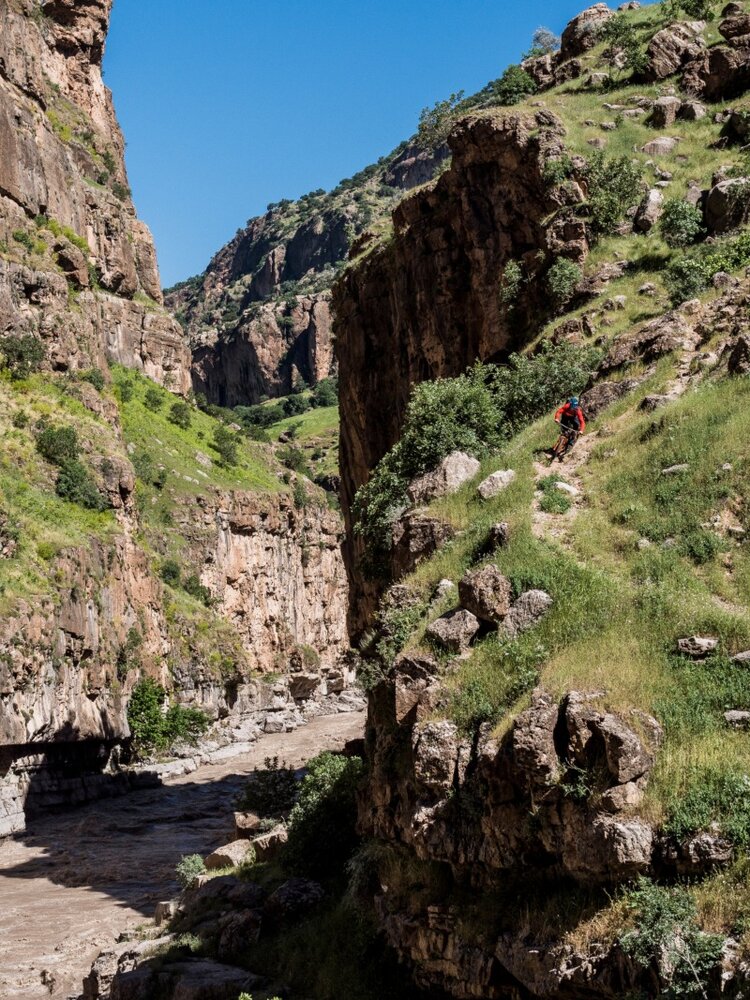
Naively none of the team expected northern Iraq to be so green. Surprisingly beautiful as it was, the tall spring grass obscured paths and made exploring trails, such as this one following the Rawanduz river, more difficult. Here, Eric Porter seizes on an open section of canyon trail above a river churning brown with snow melt.
On the flanks of Halgurd, we find a three-mile descent that rides like an alpine-slide covered in buckshot
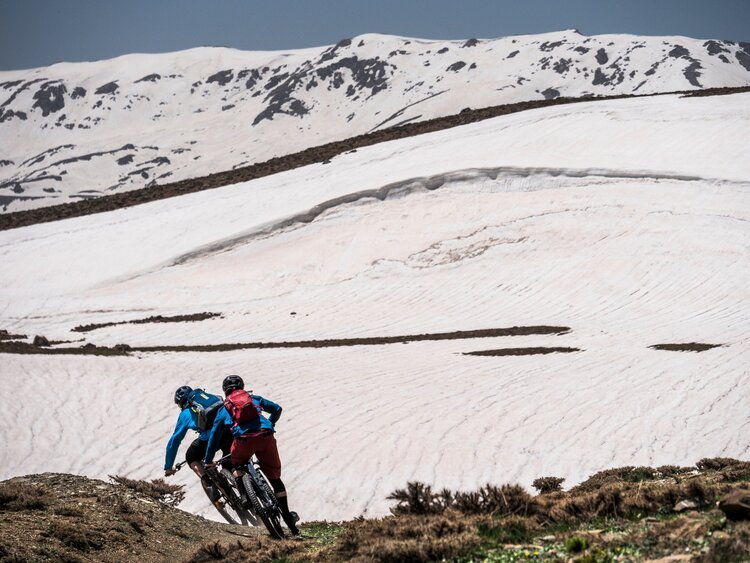
With remnants of a heavy winter snowpack preventing a full ascent of Iraq’s second highest mountain, Mount Halgurd, the team were left to explore trails on its flanks. Here Eric Porter and Dennis Beare call time on the uphill push and dive into a full 1000m descent back to the valley floor.
That brings us to Kurdistan. The region’s relative security has nurtured a tourist boom, with the number of visitors swelling 47 percent last year to more than three million. Most come from the southern and central provinces of Iraq and across the border from Iran, though a fledgling adventure tourism sector caters to intrepid Westerners.
Kurdistan in May is as lush as Park City, Utah, during spring run-off, the sweeps of grassy meadows and snow-white mountain incisors dissonant with the sandy, kiln-hot vision of Iraq seen in media reports. Another surprise is the relative affluence. Kurdistan holds approximately 30 percent of Iraq’s oil reserves, and that wealth clearly benefits the region. The airport in Erbil, the capital, is all polished steel and bright-white tiles; the city skyline is an Erector Set of cranes, and wide, well-paved highways lace a countryside dotted with freshly painted stone houses.
We snake our way three hours northeast from Erbil on buttery asphalt over two passes to the town of Choman, the jumping off point for Halgurd mountain that’s just a couple of miles from the Iranian border. The country’s second highest peak is incorporated into Iraqi Kurdistan’s first national park, Halgurd-Sakran, but the only infrastructure we note is the 12-room Halgurd Resort at the base of the mountain, where we’re the only patrons.
The plan is to drive as high as we can on the peak, then pedal in search of rideable footpaths. When spring snowbanks lick over the dirt track at 7,500 feet, we pull over. While we gear up, Rekan Rasool, our local guide, fires up a stove to brew tea. A liaison for the U.S. Consulate in Erbil, Rasool, who’s as stocky and flamboyant as a Lucha Libre wrestler, moonlights as an adventure guide. He also heads up an outdoor group for Kurds, Rock Ur Bones, which counts more than 8,000 members. He’s slowly building an outfitting business, with a fleet of 29er mountain bikes and enough camping gear to take expeditions up Halgurd, and talks of adding kayaks, climbing gear, even a houseboat. He sees the mountains as Kurdistan’s greatest untapped resource. ‘Everyone thinks only of oil or war when they think of Iraq. But they’d change their minds if they could see this’, he says, gesturing at the mountains before us.
But vestiges of the past are everywhere. Anti-personnel landmines dating back to the 1980s Iran-Iraq War freckle the border mountains, making exploration tricky . Locals mostly know the safe spots; a rudimentary, rusted-out map with red no-go zones and skull-and-crossbones symbols sits on the verge of the road. But the ordnance is constantly shifting with rain and snowmelt. Last year, Rasool found a mine 100 yards from where we’re parked. He shows me a piece of shrapnel that lodged in the side of his Kia SUV when local men disarmed the device by plinking at it with rifles.
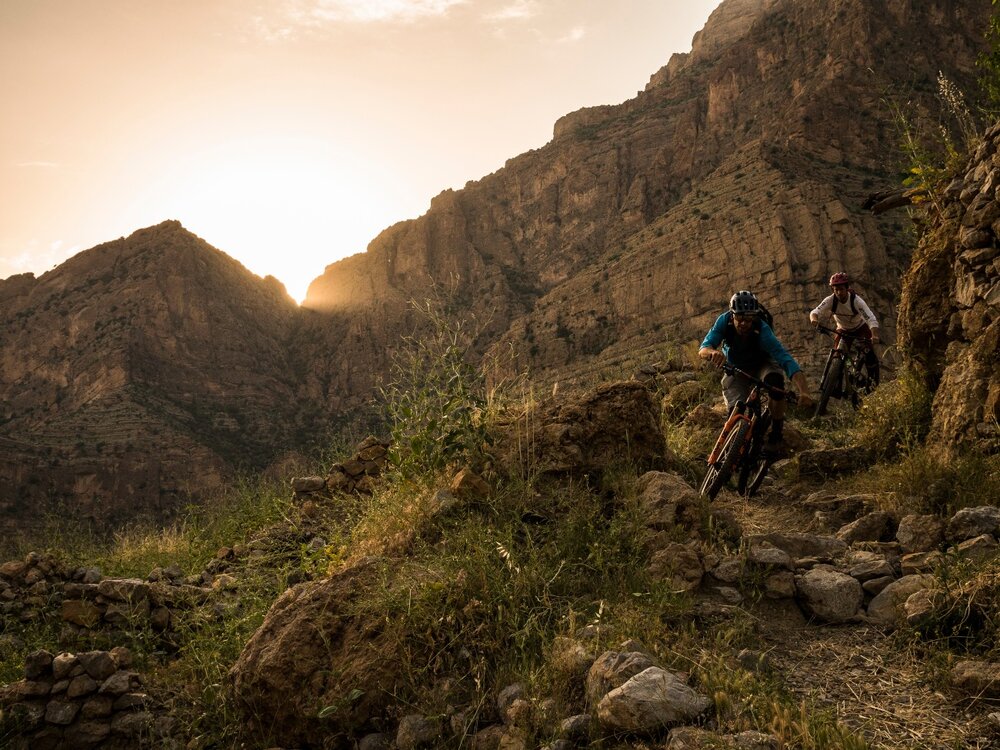
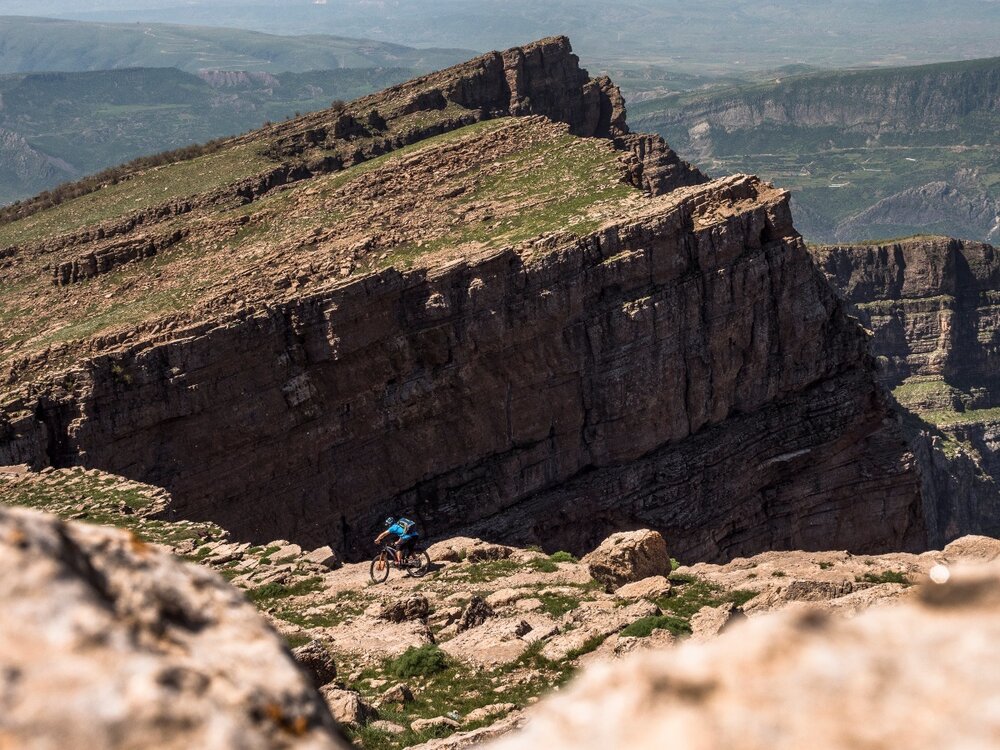
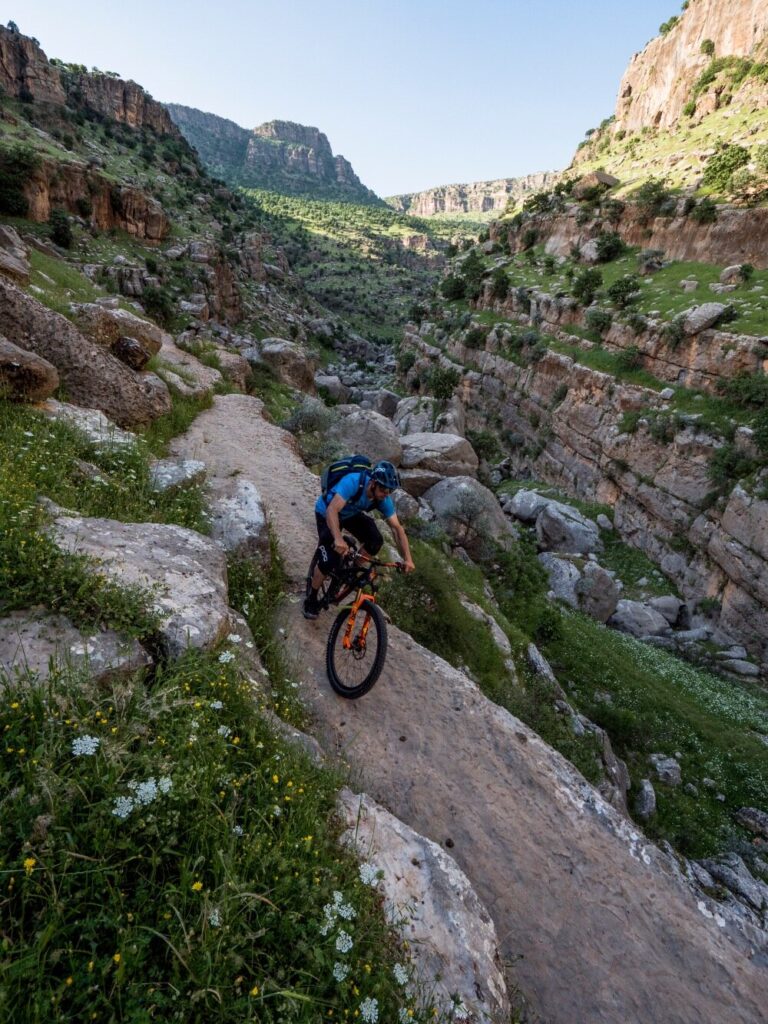
Exploring Kurdistan meant tracing the routes of old inter-village trails, many of which, like this one ridden by Eric Porter, follow ancient and spectacular gorges and canyons. By default, most of the team’s outings followed the same routine of push up – ride back down, but no-one was complaining.
When our mugs are empty, our group pedals up the road. But between deep banks of snow and the triangular, brown steel mine markers that pock the hillsides, no one is keen to venture beyond the two-track. At our high point, we have a front-seat view of Iraq’s tallest peak, Cheekha Dar (3611m). The mountain straddles the Iranian border, with fortifications lining its flanks and an Iranian observation post perched on its summit. All this renders the peak off-limits to climbers, which is why Tom brings his climbing clients to Halgurd, just 13 feet lower. The militarised border also explains why we’re having so much trouble finding trail. Saddam Hussein’s engineers built a network of roads in the 1980s to bring heavy artillery to the region’s highest summits and remotest valleys. When the war ended, people stuck to the roads, which were unmined, and vegetation reclaimed the footpaths that would have made fine single track.
One of the biggest surprises is the diversity of the riding. We push and carry our bikes for miles up tablets of brown limestone in the Khalan Valley, only to find that, on the way down, the rock is slippery, picky, and good fun that’s almost as slow-going as the ascent. We camp in the emerald Asumarah Valley, where we splash down a 30-yard, lichen-slicked waterfall drop, then, after sweating out several miles of bushy river trail, rinse off in crystal pools of snowmelt. And on the flanks of Halgurd, we even find a three-mile-long descent that rides like an alpine-slide covered in buckshot, all courtesy of some local kids with 125cc motos.
Still, despite tantalising potential, the mountain biking here isn’t making anyone’s Top 5 list. Almost every path we find is invariably too steep to pedal up, often grassier than a Swiss meadow, and coursing with bowling ball-size rocks. The terrain is monumental and endless, but the access and difficulty make it too intimidating for most. As we explore the northwest flank of Safin Mountain, a leafy cut up a wall of blue limestone with a scratchy, perilous drop-in, it becomes clear that Kurdistan has riding potential in the way remote peaks in the Himalaya hold climbing promise: it’s edge-of-the-map stuff, all about exploration
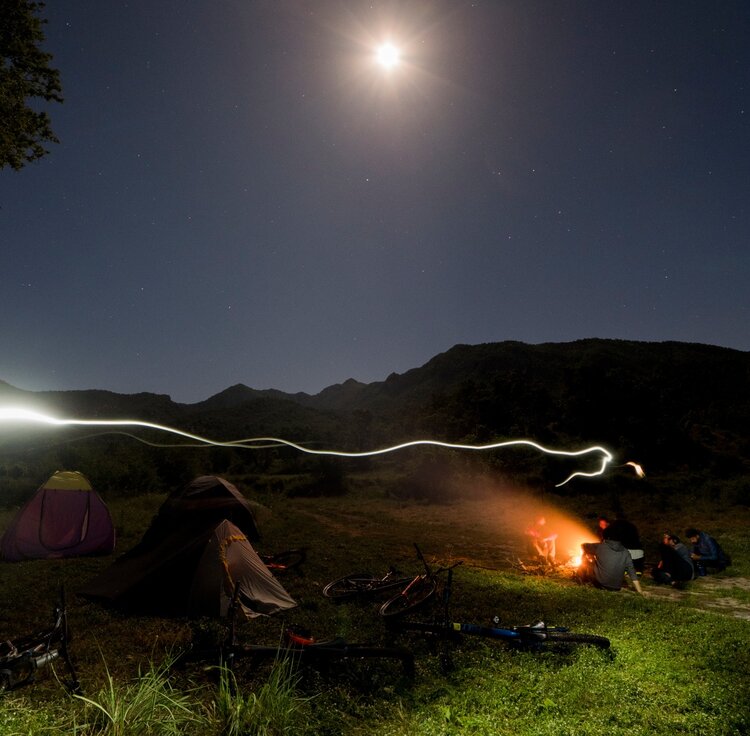
This meadow camp proved to be one of the most peaceful nights any of us had ever enjoyed, once the buzz of the mosquitoes had subsided.
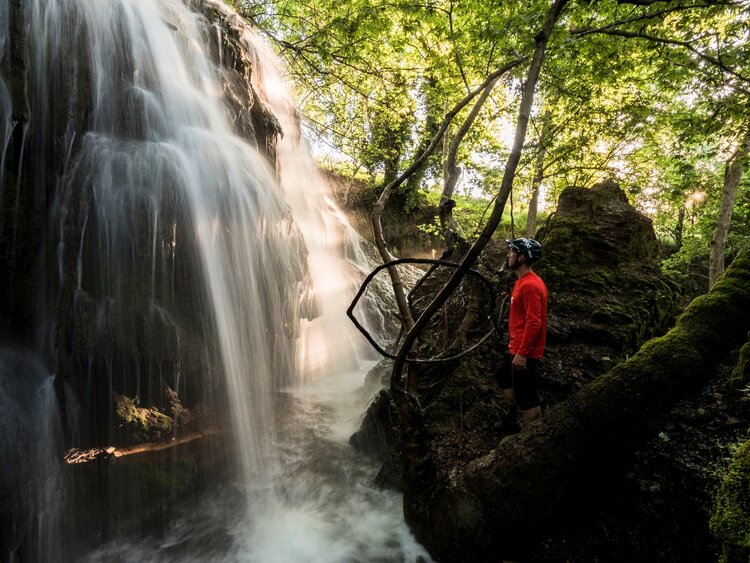
Taking a break at a secluded waterfall: Kurdistan proved to be a never-ending succession of unexpected wonder, beauty and calm.
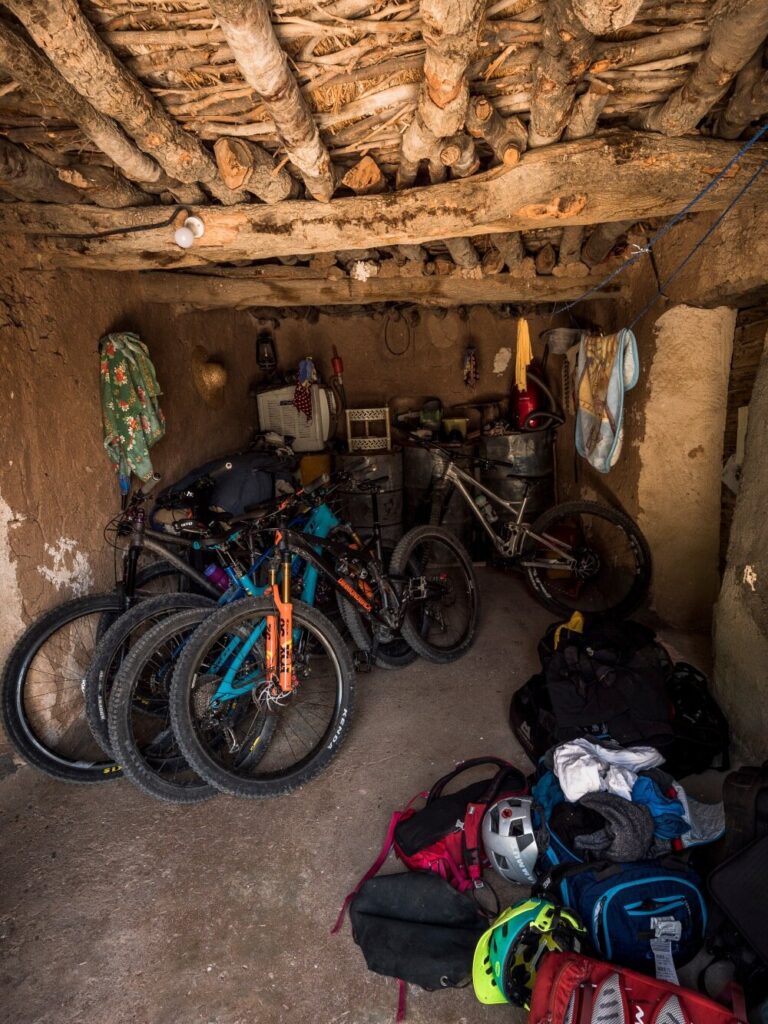
Team bikes sit in a homestay outbuilding. Accommodation on the trip ranged from gold-trimmed hotels to homestays and mountain camps
After the descent from Safin, we roll into Shaqlawa, a hill station of 25,000 that draws Iraqi tourists with its Mediterranean climate and scores of restaurants. It’s Ramadan, the ninth month of the Islamic calendar, which most people observe by fasting from dawn until dusk.
After dark, which is when we go out, the streets are swarming and cafés overflowing. Dinner is the usual Middle Eastern fare — chicken and lamb kebabs, rice, soup, flat bread — after which we fall into the procession of locals strolling the cobbled main street. Men with Elvis Presley bouffant haircuts, the vogue in the country, and pointy brogues bubble hookahs on open-air patios, while families tuck into shoe shops and cell phone stores. More women wear jeans than headscarves, and children drag their parents to the ice cream shops on almost every corner. It’s like a Rated G version of the Atlantic City boardwalk, complete with American muscle cars cruising laps, including one particularly tricked out black Chevy Camaro. Sometimes, even on riding trips, it’s not always about the riding.
On our next to last day in Kurdistan, we explore Sar Murid Canyon, the easternmost stop on the trip, less than 10 miles from the Iranian border. From where we park amidst smashed-out concrete bunkers, slabs of limestone adorn the grassy hillside like half-tumbled dominos, and stone armaments on the cliff walls testify to centuries of civilisation.
We climb the canyon following a mirror-clear, spring-fed creek. The chasm necks down to 20 yards across, then opens into a broad vertiginous valley that stair-steps northward beneath a fortress of rock. This is the riding we’ve been seeking: strenuous but manageable, and in a silent, wild setting. For a moment, it’s tempting to imagine adventure tourism taking root in Kurdistan
The chasm opens into a broad valley winding north beneath a fortress of rock: this was the riding we’d been seeking: strenuous and in a silent, wild setting.
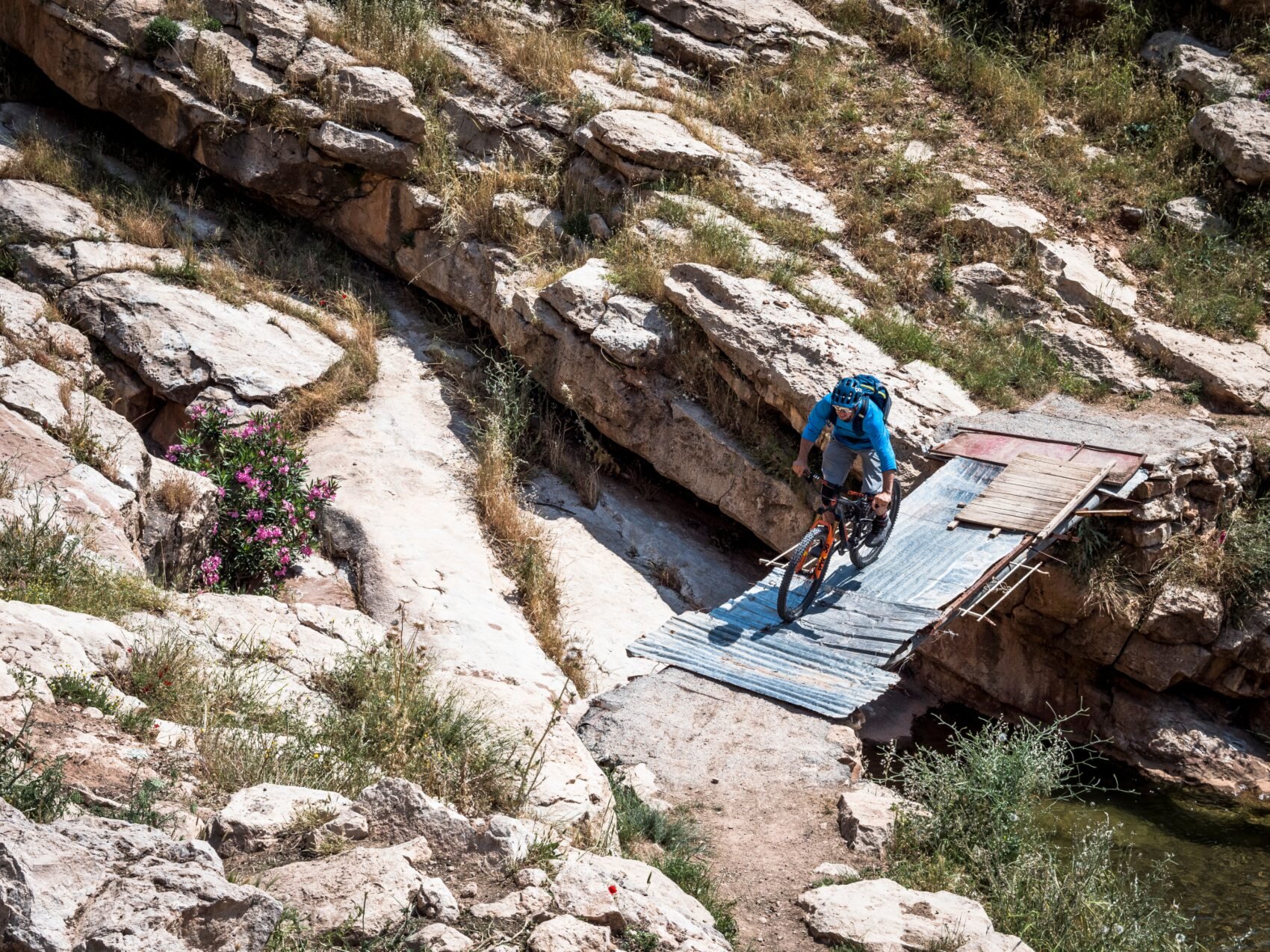
Kurdistan has plenty of oil money, but you’ll find plenty of make-do attitude once you leave the towns behind. Here, Eric Porter puts his trust in a little Kurdish bridge-building resourcefulness to cross a creek.
As we climb, Rasool tells us that he recently bought a pair of old stone buildings in the village ahead, with plans to turn them into a backcountry lodge. But after 45 minutes of climbing, the trail ends at a freshly tarred road. Rasool is speechless. When he’d been here a month before, there was no road – and no plans for one.
We continue on the new road to the village of Sar Murid, a half dozen squat stone structures and walls inhabited by an extended family. One of the younger sons, a 20-something farmer with a Kalashnikov on his shoulder, comes out to talk with us. He says that his family didn’t know about the road till the machines arrived and began cutting it, though he’s not complaining. Once complete, the road will transform the trip to town from a three-hour circumnavigation to a jaunt of less than an hour. He doesn’t know why the road is being built, but he’s heard rumoru of a mine. Rasool’s eyes smoulder with rage. ‘If war doesn’t destroy this country, corruption will’, he says.
The road and the mine would scuttle his blueprint for a wilderness lodge, but Rasool seems more anguished over the destruction of the canyon than the personal setback. He slumps on the limestone slab roof of one of his huts, his head in his hands. ‘Kurdistan has so much potential’, he tells me, ‘but also so many challenges. I don’t know which will win, but sometimes I’m afraid.’
It’s a poignant exhalation to the trip, which has swung between astonishing beauty and generosity and the brutal realities of living in the shadows of one of the world’s most troubled regions. The mountains here beckon, but in reality very few outsiders are likely to come at the present time.
We turn our bikes back toward the truck and rip down valley, skipping off stacks of boulders, pushing through corners till our tires rip off the dirt, and throwing up wakes of icy creek water that glisten gold in the gathering evening light. This is no doubt the first-ever mountain bike descent of Sar Murid. It also feels like the last.
Don’t miss a single adventure
Sign up to our free newsletter and get a weekly BASE hit to your inbox
You might also like
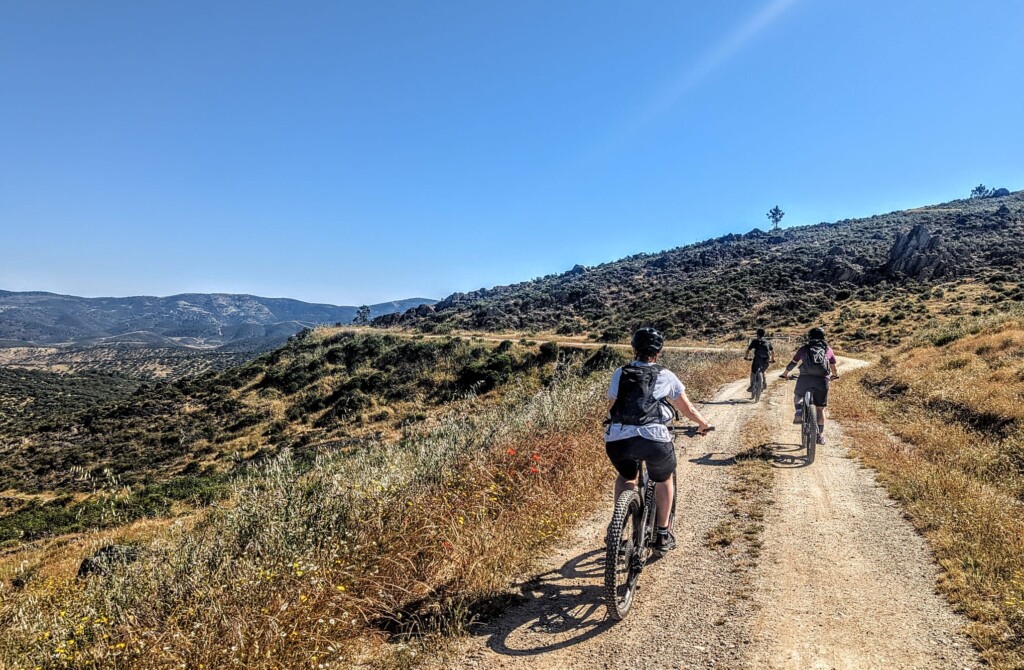
Story • Matthew Pink • May 30, 2025
Smuggler lanes and donkey trails: e-MTB in Andalusia
Hazy days zig-zagging the Andalusian sierra through a mesh of secret trails
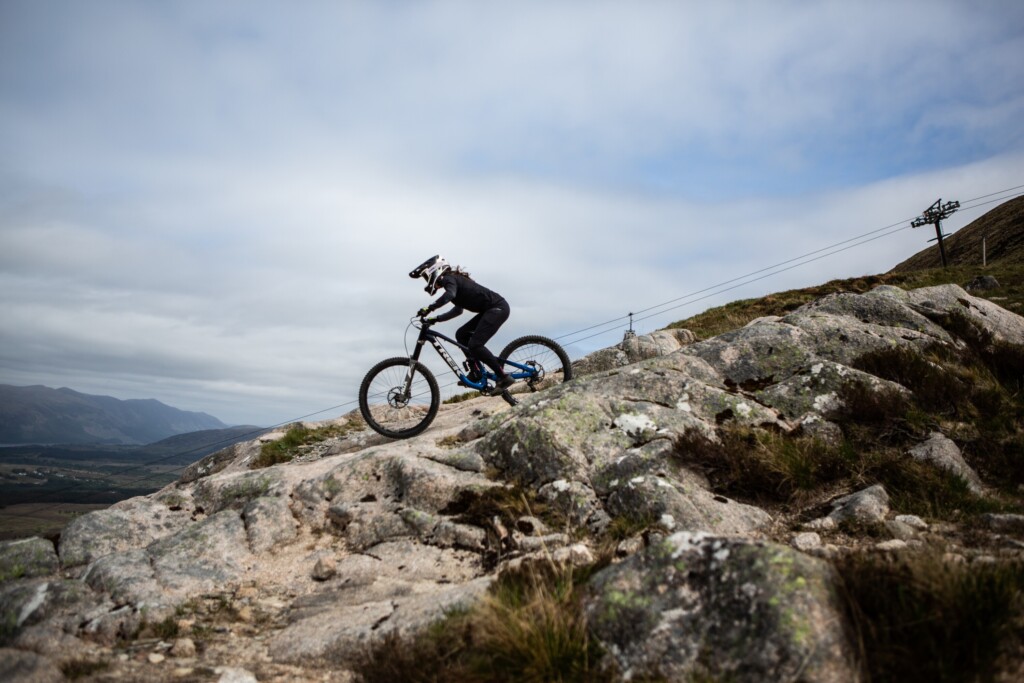
Interview • Beth Chalmers • Sep 15, 2023
Mud, Rock and Roots: In Conversation With Nina-Yves Cameron
Beth Chalmers catches up with the Scottish downhill racer, talking progress, community and how the Highlands shaped her as a rider
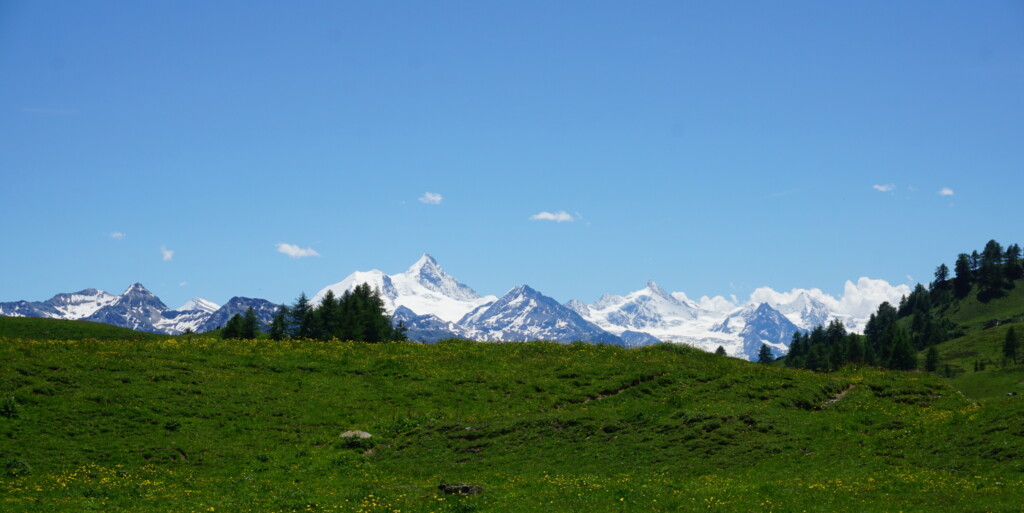
Story • Chris Hunt • Jul 04, 2023
Evolution of Flow: E-mountain Biking in the Swiss Alps
Exploring Crans Montana and the Tièche valley on two wheels
